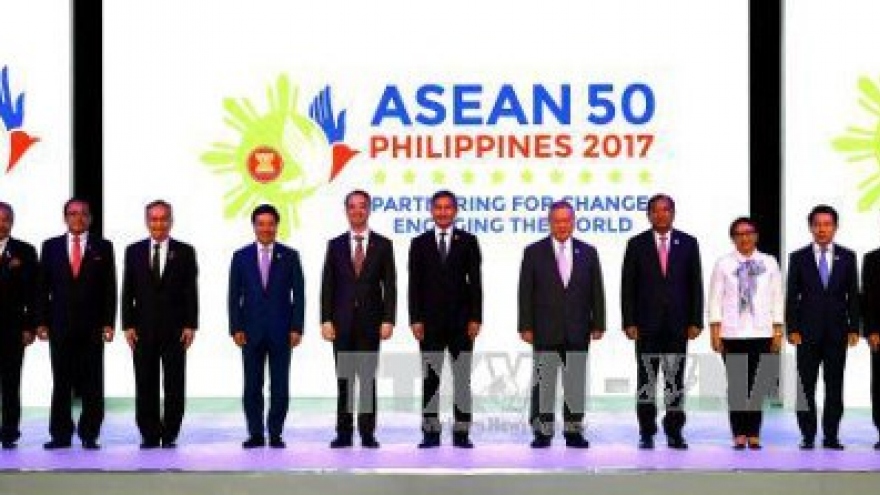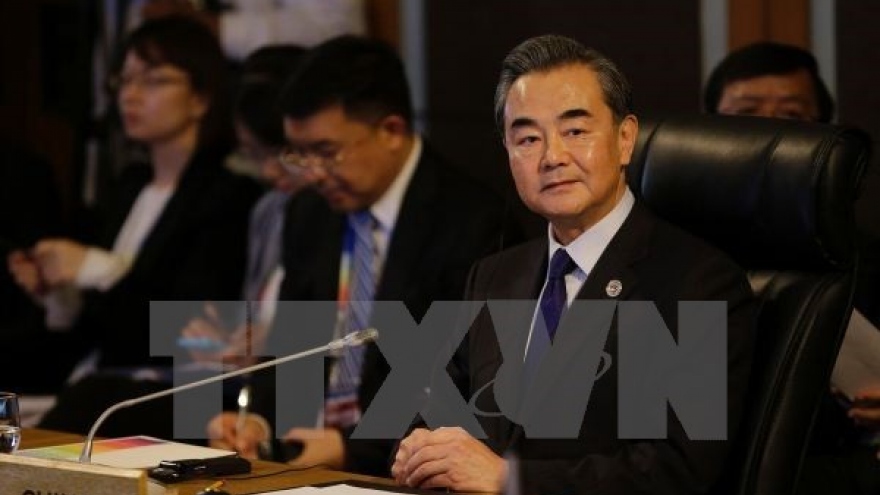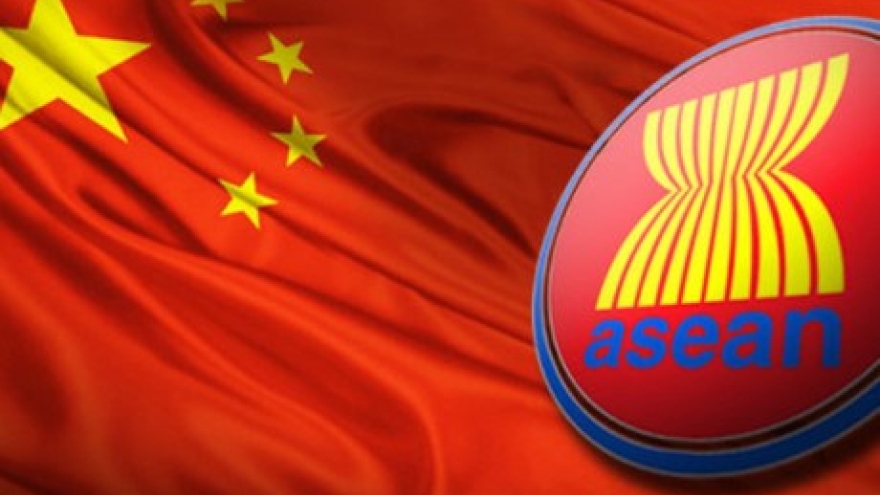ASEAN, dialogue partners devise major cooperation orientations
The ASEAN and its 10 partner countries agreed several major cooperation plans at the ASEAN Post Ministerial Conference (PMC+1) sessions in Manila, the Philippines, on August 6.
 |
At the PMC+1 sessions, the foreign ministers from ASEAN and the 10 partner nations reviewed relations over the past year and devised plans for future cooperation.
They focused on economy, trade, investment, connectivity, development gap narrowing, climate change, natural disaster management, people-to-people exchange and education. They also discussed regional and international issues of shared concern.
The dialogue partners congratulated ASEAN on its 50th founding anniversary and hailed the bloc’s achievements after almost two years since the ASEAN Community was established. They pledged to continue supporting ASEAN to enhance economic and regional connectivity, narrow development gaps and boost free and equal trade through existing free trade agreements (FTAs) and those with bigger framework such as the Regional Comprehensive Economic Partnership (RCEP).
The partner countries also lauded the grouping’s role in maintaining peace, stability and prosperity in the region. They affirmed their support for ASEAN’s central role in an evolving regional architecture.
Regarding regional and global issues, the foreign ministers discussed traditional and non-traditional security challenges, including the situations in the Korean Peninsula and the East Sea, terrorism and cyber security. They stressed the need for closer coordination to deal with issues of common concern.
The officials affirmed that the maintenance of peace, stability, security, safety and freedom of navigation in and overflight over the East Sea is a common interest, underlining the importance of resolving disputes by peaceful means based on international law, including the 1982 UN Convention on the Law of the Sea (UNCLOS) and promoting the implementation of the Declaration on the Conduct of Parties in the East Sea (DOC). They welcomed ASEAN’s and China’s adoption of a draft framework for a code of conduct (COC) in the East Sea and voiced their hope that both sides will soon negotiate to build an effective COC.
At the PMC+1 with Canada, the ministers applauded the outcomes of the Plan of Action to Implement the ASEAN-Canada Enhanced Partnership. They agreed to continue reinforcing bilateral cooperation in trade and investment, connectivity, education, natural disaster management, climate change and women’s empowerment. They also agreed to consider an ASEAN-Canada FTA.
At the PMC+1 with the Republic of Korea (RoK), the foreign ministers highlighted the outcomes of the ASEAN-RoK Plan of Action to Implement the Joint Declaration on Strategic Partnership for Peace and Prosperity and applauded various activities in the ASEAN-RoK Tourism Cooperation Year, especially the opening of the ASEAN Cultural Centre in the RoK’s Busan city last September. They also lauded the nation’s assistance to improving ASEAN’s capacity to respond to challenges in the region.
The ministers also vowed to step up cooperation to raise bilateral trade to 200 billion USD in 2020.
At another meeting, the ASEAN and New Zealand foreign ministers agreed to continue carrying out the People Strategy and the Prosperity Strategy and the ASEAN-Australia-New Zealand FTA (AANZFTA). They decided to boost ties in fields such as education, small- and medium-sized enterprises development, agriculture and renewable energy.
ASEAN appreciated New Zealand’s education and training support programmes, particularly the ASEAN Young Business Leaders Initiative and the English Language Training for Officials. On the occasion of the bloc’s 50th founding anniversary, New Zealand announced it will provide ASEAN with lecturer training scholarships.
At the meeting with Australia, the two sides agreed to foster cooperation in tackling security challenges such as terrorism, violent extremism and human trafficking. They recognised the implementation outcomes of the AANZFTA, the ASEAN-Australia Economic Cooperation Programme and the ASEAN-Australia Development Cooperation Programme.
They lauded the programmes and initiatives implemented in the New Colombo Plan to bolster educational cooperation and people-to-people links between the two sides.
At the PMC+1 with China, the ASEAN and Chinese foreign ministers applauded positive outcomes in various areas of co-operation, while stressing the need for more collaboration in trade, connectivity, development gap narrowing, regional integration enhancement, infrastructure development and production capacity improvement. They agreed to carry out the Plan of Action to Implement the Joint Declaration on ASEAN-China Strategic Partnership for Peace and Prosperity and the ASEAN-China FTA.
ASEAN and China will accelerate negotiations for the RCEP, consider combining the Master Plan on ASEAN Connectivity 2025 and the Belt and Road Initiative and make use of support resources, especially the ASEAN-China Investment Co-operation Fund and the Asian Infrastructure Investment Bank.
The ministers agreed to designate 2018 as the China-ASEAN Year of Innovation while signing an amended memorandum of understanding on the ASEAN-China Centre.
At the meeting, the ASEAN and Chinese officials adopted a draft framework for a COC in the East Sea, creating a foundation for substantive negotiations for the deal. They also underscored the importance of keeping peace, stability, security and safety of navigation in and overflight over the East Sea, peacefully settling disputes on the basis of international law, including the 1982 UNCLOS, fully implementing the DOC, exercising self-restraint and avoiding actions that may escalate tensions.
As the coordinator for ASEAN-India relations, FM Minh and Indian Secretary of State for External Affairs General Vijay Kumar Singh co-chaired the ASEAN Post Ministerial Conference plus India. The two sides agreed to continue to implement the ASEAN-India Action Plan, especially in economics, trade, investment, while increasing competitiveness of small- and medium-sized enterprises and responding to security challenges more effectively.
They agreed to speed up the signing of a memorandum of understanding on establishing an ASEAN-India Centre.
The ministers welcomed activities to celebrate the 25th anniversary of the ASEAN-India dialogue partnership, pledging to contribute to holding a commemorative summit marking the 25th anniversary of the partnership on January 25-26, 2018, in India’s New Delhi.
For the US, the ministers reaffirmed the important principles for ASEAN-US relations mentioned in the Sunnylands Declaration issued in February 2016, while emphasising the need to build on achievements gained in the past 40 years.
The two sides agreed to focus on intensifying economic and trade cooperation, developing small- and medium-sized enterprises, boosting collaboration in education and maritime issues and responding to non-traditional security challenges.
The ASEAN nations welcomed the US’s maintenance of its commitments to the region and President Donald Trump’s pledge to attend regional meetings later this year.
For the partnership with Japan, ASEAN lauded the country’s help in building the ASEAN Community, including its commitments to helping narrow development gaps, realise quality growth in the Mekong region and improve infrastructure and human resources for industry.
At the conference, the ministers approved a plan on adjustments to the Vision Statement on ASEAN- Japan Friendship and Co-operation and vowed to implement the 2016-2025 Framework for Comprehensive Economic Partnership.
With the European Union (EU), the countries acknowledged the outcomes of the ASEAN-EU Action Plan for 2013-2017, approving a Declaration on the 40th anniversary of the bilateral relations and a new Action Plan for 2018-2022 and an ASEAN-EU Declaration on the Paris Agreement. They reaffirmed their commitment to working together on climate change.
At the conference with Russia, the ministers acknowledged progress in implementing the outcomes of the ASEAN-Russia Commemorative Summit in Sochi in May 2016 and the 2016-2020 ASEAN-Russia Action Plan. They reached a consensus on approving a declaration of foreign ministers on fighting international terrorism and a plan to make a report on the ASEAN-Russia Eminent Persons’ Group.
Leading the Vietnamese delegation, Deputy PM and FM Minh actively contributed ideas to discussions at the conferences.
He lauded the support from the partners for ASEAN during its community building and maintaining its central role in the region.
He also proposed deepening bilateral cooperation with a focus on ASEAN’s priority fields, including tightening connectivity, narrowing development gaps and dealing with trans-national crimes, maritime security and safety, disaster management and disease prevention.
Regarding regional and international issues, Minh stressed the central role of ASEAN and the importance of cooperation between the ASEAN State members and their partners for peace, stability and development in the region.
He shared concern over recent and current complicated developments in the East Sea, including unilateral actions like land reclamation and militarisation that erode trust and affect peace, stability, maritime and aviation security and safety in the East Sea.
He asked partner countries to maintain their support for ASEAN and contribute to peace and stability in the region, while encouraging parties involved to obey basic principles such as exercising self-restraint and settling disputes by peaceful means on the basis of international law, including the UNCLOS, implementing the DOC fully and effectively and working toward the formation of an effective COC in the East Sea, based on the freshly-approved draft framework.
On August 7, the foreign ministers will attend the ASEAN Plus Three Foreign Ministers’ Meeting with China, the Republic of Korea and Japan, the 7th East Asia Summit Foreign Ministers Meeting with China, the Republic of Korea and Japan, the US, India, Russia, Australia and New Zealand and the 24th ASEAN Regional Forum with the participation of the 10 ASEAN member states and 17 partner countries.



